You might be under the impression that any guitar can handle metal, and there’s a grain of truth to that. After all, Iron Maiden has famously rocked Stratocasters, proving you don’t necessarily need a menacing, pointy instrument loaded with high-output humbuckers to play heavy music. However, the best guitars for metal music are intentionally designed to excel in this genre, offering features tailored for brutally heavy riffs, blazing fast solos, and often, a distinctly dark and aggressive aesthetic.
Whether your metal tastes lean towards death metal’s guttural intensity, black metal’s icy blast beats, metalcore’s breakdown-heavy anthems, or any of the countless subgenres within this vast musical landscape, this guide will help you find the perfect guitar to fuel your sonic aggression. We’ve spent years rigorously reviewing metal guitars, pushing them to their limits across a spectrum of techniques, from thunderous power chord rhythms to surgically precise djent riffs in the depths of drop tunings.
With over two decades immersed in the world of heavy bands, we bring a wealth of experience to the table. If you’re new to the metal genre or just starting your journey into the realm of metal guitars, be sure to explore our FAQs section. For seasoned players who are fluent in the language of Fishman Fluence pickups and Floyd Rose tremolos, keep scrolling to discover our top recommendations for the Best Guitar For Metal Music.
Best Metal Guitars: Top Picks
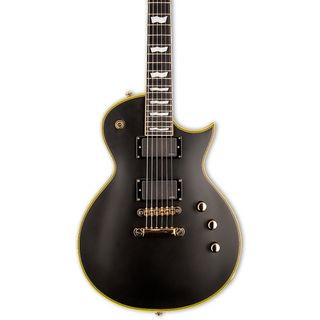 An ESP LTD EC-1000Best Overall Metal Guitar
An ESP LTD EC-1000Best Overall Metal Guitar
- ESP LTD EC-1000
The ESP LTD EC-1000 is a ubiquitous sight on the metal gigging circuit, and for good reason. It masterfully blends exceptional playability with tonal versatility, making it capable of tackling virtually any metal subgenre you can imagine.
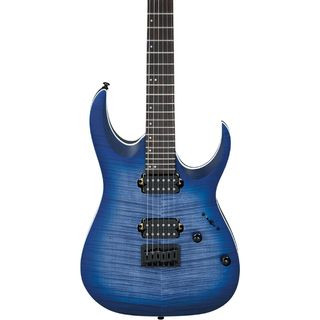 An Ibanez RGA42FMBest Budget Metal Guitar
An Ibanez RGA42FMBest Budget Metal Guitar
2. Ibanez RGA42FM
For guitarists seeking to unleash heavy tones without breaking the bank, the Ibanez RGA42FM hits the sweet spot. It delivers impressive playability, powerful-sounding pickups, and a distinctly metal visual appeal, all at an accessible price point.
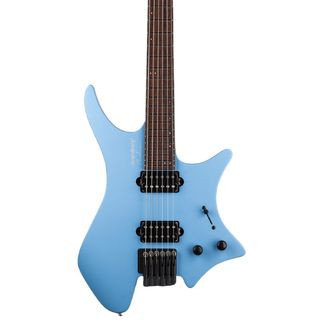 A Strandberg Boden EssentialBest Metal Guitar for Shredding
A Strandberg Boden EssentialBest Metal Guitar for Shredding
3. Strandberg Boden Essential
If your playing style revolves around lightning-fast shred licks, the Strandberg Boden Essential stands out as one of the fastest-playing guitars available. Its versatile pickup configuration also ensures it can cover a wide sonic territory.
Best Overall Metal Guitar
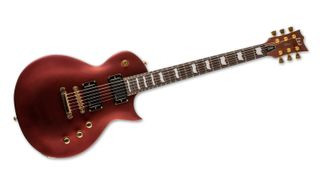 Close-up of the body of a violet ESP LTD EC-1000 electric guitar showcasing its finish
Close-up of the body of a violet ESP LTD EC-1000 electric guitar showcasing its finish
(Image credit: ESP)
1. ESP LTD EC-1000
A heavyweight single-cut riff machine delivering humbucker tones spanning across metal eras.
Our Expert Review:
Specifications
- Body: Mahogany
- Neck: Mahogany, set-thru
- Scale: 24.75″
- Fingerboard: Ebony with pearloid flag inlays
- Frets: 24
- Pickups: 2x Fishman Fluence Modern humbuckers (bridge and neck)
- Controls: 2 x volume, 1 x master tone (push/pull coil-split), 3-way toggle pickup switch
- Hardware: TonePros Locking Tune-O-Matic Bridge with Stopbar Tailpiece
- Left-handed: No
- Finish: Violet Andromeda
Reasons to Buy
- Incredibly balanced feel
- Fishman Modern Fluence humbuckers are exceptional
- Sustain for days
Reasons to Avoid
- If you prefer a more aggressively styled, “pointy” guitar
At a Glance
✅ Buy if you want a great value all-around metal guitar: The EC-1000’s popularity among heavy bands is no accident. It’s a versatile, well-constructed instrument that provides outstanding value for its price.
❌ Avoid if you prioritize a dedicated shred guitar: While capable of fast playing, its more traditional design doesn’t make it the absolute fastest or sleekest option for dedicated shredders.
Equipped with Fishman’s Modern Fluence humbuckers, ESP/LTD’s flagship single-cut model is adept at handling metal from any era. The advanced switching system includes push/pull coil-split functionality for accessing single-coil tones, alongside a substantial amount of power to add serious weight to your riffs.
The Tune-O-Matic bridge ensures reliable performance, exceptional sustain, and a solid foundation for even the most aggressive right-hand picking techniques. However, don’t mistake this guitar solely for rhythm playing.
The thin-U neck profile is remarkably comfortable for fast lead work, complemented by extra-jumbo frets and a 13.8” radius that facilitates effortless navigation to the upper reaches of the fretboard during our testing. You’ll also find a smoothly sculpted neck heel for enhanced access to the higher frets. And let’s not forget the stunning finish – Violet Andromeda – which dynamically shifts in appearance depending on the light.
Read our full ESP LTD EC-1000 review
Best Budget Metal Guitar
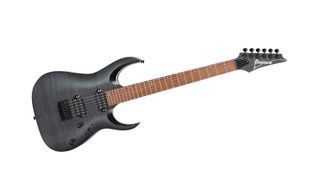 Angled shot of a blue Ibanez Standard RGA42FM electric guitar with flame maple top
Angled shot of a blue Ibanez Standard RGA42FM electric guitar with flame maple top
(Image credit: Ibanez)
2. Ibanez Standard RGA42FM
One of the best metal guitars for achieving speed on a budget.
Our Expert Review:
Specifications
- Body: Meranti with flame maple top
- Neck: Maple, bolt-on
- Scale: 25.5″
- Fingerboard: Jatoba
- Frets: 24
- Pickups: 2x Ibanez Quantum humbuckers (neck and bridge)
- Controls: 1 x master volume, 1 x master tone, 5-way blade pickup switch
- Hardware: F106 hard-tail bridge
- Left-handed: Yes
- Finish: Transparent Gray Flat, Dragon Eye Burst Flat, Blue Lagoon Burst Flat
Reasons to Buy
- Classic RG design with ergonomic body contours
- Excellent finish options
- A great platform for modifications
Reasons to Avoid
- Jatoba fingerboard is functional, but rosewood is often preferred by some players
At a Glance
✅ Buy if you need a metal guitar on a budget: The RGA42FM delivers phenomenal value, making it an ideal choice for beginner metal guitarists or experienced players needing a reliable backup instrument.
❌ Avoid if you require highly versatile tones: The budget-friendly pickups are well-suited for metal tones but may lack the depth and nuance of higher-end models.
Ibanez launched their iconic RG series in 1987, and its combination of sharp horns, thoughtfully sculpted body contours, and pioneering super-slim Wizard neck profiles quickly solidified its status as a favorite S-style guitar among players worldwide.
While RG models span a wide price range, this stripped-down version offers exceptional financial accessibility. It features a fast Wizard III maple neck, measuring a mere 19mm thick at the first fret and only 21mm at the 12th fret, facilitating effortless speed and playability.
While it forgoes a Floyd Rose tremolo, the hard-tail bridge provides a stable and reliable platform, perfect for aspiring shredders who prefer to focus on playing rather than bridge adjustments. The 5-way blade selector switch offers a versatile range of humbucker and split-coil tones, expanding its sonic palette beyond pure metal aggression.
Best Metal Guitar for Shredding
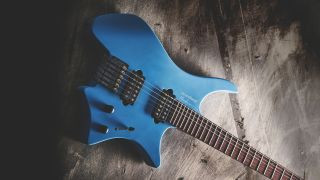 Front view of a Strandberg Boden Essential 6 Tremolo electric guitar in blue finish
Front view of a Strandberg Boden Essential 6 Tremolo electric guitar in blue finish
(Image credit: Future)
3. Strandberg Boden Essential
A futuristic shredding option now within reach of the average player.
Our Expert Review:
Specifications
- Body: Meranti
- Neck: Roasted Plain Maple, Bolt-on
- Scale: 25.5″
- Fingerboard: Rosewood
- Frets: 24, Jumbo, Stainless Steel
- Pickups: 2x Strandberg OEM Humbucker
- Controls: 1 x volume, 1 x tone, 5-way blade pickup switch
- Hardware: Strandberg EGS Arc 6-string Bridge, Strandberg EGS Arc tuners
- Left-handed: No
- Finish: Elemental Blue, Black Granite, Astro Dust
Reasons to Buy
- Ergonomic EndurNeck profile promotes fast playing
- Versatile pickups for a range of metal styles
- Well-balanced and comfortable to play
- Relatively compact and lightweight
Reasons to Avoid
- Futuristic design might not appeal to all players
- EndurNeck profile requires an adjustment period for some
At a Glance
✅ Buy if you want to shred: With its ultra-fast neck and silky smooth ergonomics, the Boden Essential is the perfect guitar for metal music focused on avant-garde and shred styles.
❌ Avoid if you prefer traditional neck profiles: The Strandberg EndurNeck profile is unique and may take some time to adjust to if you are accustomed to conventional guitar necks.
Looking like a glimpse into the future of electric guitars, the Strandberg Boden Essential is our top pick for shredders. Strandberg guitars were once exclusively available to high-end buyers, but the Essential series brings their innovative designs and performance to a wider range of metal guitarists.
While particularly appealing to shredders and players exploring more experimental metal genres, the Boden Essential is a surprisingly adaptable guitar. It can handle everything from bright, Strat-like cleans to powerful, mid-range focused metal tones. The dual OEM humbuckers, combined with a 5-way switch, provide a wide array of sounds suitable for clean passages, djent rhythms, and soaring leads.
The EndurNeck profile is a standout feature, offering a unique playing experience that must be felt to be truly appreciated. Its design provides a larger surface area for your thumb, promoting a straighter wrist and potentially better playing technique. We can confidently attest to the fretboard’s shred-ready nature. While the EndurNeck requires an initial adjustment, once you acclimate, you may find it difficult to return to a traditional neck profile.
Best 7-String Metal Guitar
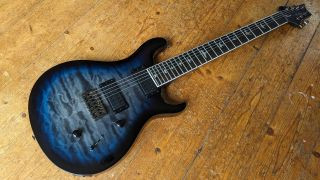 Angled shot of a PRS SE Mark Holcomb SVN 7-string electric guitar in blue finish
Angled shot of a PRS SE Mark Holcomb SVN 7-string electric guitar in blue finish
(Image credit: Future/Matt McCracken)
4. PRS SE Mark Holcomb SVN
A versatile 7-string that maintains heaviness while covering a broad tonal spectrum.
Our Expert Review:
Specifications
- Body: Mahogany
- Neck: Maple
- Scale: 26.5″
- Fingerboard: Ebony
- Frets: 24
- Pickups: 1x Seymour Duncan Scourge Humbucker (bridge), 1x Seymour Duncan Scarlet Humbucker (neck)
- Controls: 1 x volume, 1 x tone (push/push coil-tap), 3-way blade pickup switch
- Hardware: PRS String-through Plate Style
- Left-handed: No
- Finish: Holcomb Blue Burst
Reasons to Buy
- Highly versatile pickup combination
- Excellent value for a 7-string guitar
- Flat fretboard radius conducive to fast playing
Reasons to Avoid
- Pickups are not as high-output as some might expect from a metal guitar
At a Glance
✅ Buy if you are into prog metal: With its versatile pickups and extended range, the Holcomb SVN is perfectly suited for prog-metal players who require both heavy riffs and articulate clean tones.
❌ Avoid if you prefer extremely high output pickups: The pickups on this model are voiced for versatility rather than maximum output, so if you prioritize an intensely hot sound, this might not be the ideal choice.
As a key member of Periphery’s formidable three-guitar lineup, Mark Holcomb is undoubtedly an authority on drop-tuned riffing. His signature PRS SE Mark Holcomb SVN reflects his versatility, delivering both crushing, downtuned distorted tones and pristine clean sounds.
Featuring a Seymour Duncan Scourge in the bridge and a Seymour Duncan Scarlet in the neck, this guitar boasts a surprisingly versatile set of pickups that aren’t as aggressively ‘hot’ as some dedicated metal pickups. The bridge pickup is articulate and aggressive, while the neck pickup offers exceptional clean tones, further enhanced by a push/pull coil split for even greater sonic flexibility.
The longer 26.5″ scale length may require an adjustment period if you are new to extended-range guitars, and players with smaller hands might find the first few frets feel substantial. PRS’s neck profile is also distinct from some other brands, but we found it exceptionally comfortable, often making us forget we were playing a 7-string instrument.
Best 8-String Metal Guitar
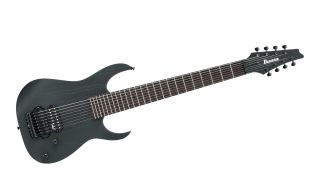 Front view of a black Ibanez M80M 8-string electric guitar
Front view of a black Ibanez M80M 8-string electric guitar
(Image credit: Ibanez)
5. Ibanez Meshuggah Signature M80M
The signature guitar of Meshuggah, perfectly engineered for ultra-low tunings.
Our Expert Review:
Specifications
- Body: Ash
- Neck: 5-piece Maple/Walnut, Bolt-on
- Scale: 29.4″
- Fingerboard: Jatoba
- Frets: 24, Jumbo
- Pickups: Lundgren M8P Humbucker
- Controls: 1 x master volume, 1 x master tone
- Hardware: FX Edge III-8 bridge, Closed Gear tuners
- Left-handed: No
- Finish: Black
Reasons to Buy
- Extremely long 29.4″ scale length for optimal low-end performance
- Incredible sounding Lundgren pickup, renowned for extended-range guitars
- Comfortable and playable neck feel despite the extended range
Reasons to Avoid
- Single pickup configuration may not suit players seeking maximum tonal variety
At a Glance
✅ Buy if you are pursuing ultra-low tunings: With its massive 29.4″ scale and 8 strings, the Ibanez M80M empowers you to explore tunings as low as drop-E if desired, making it the best guitar for metal music in extreme low ranges.
❌ Avoid if you prioritize effortless playability: 8-string guitars inherently present a steeper learning curve, further amplified by the M80M’s exceptionally long scale length.
Created for the band that popularized ultra-low tunings and extended-range guitars, the Ibanez Meshuggah Signature M80M rightfully earns its place as our top 8-string recommendation. It’s unapologetically extreme, but if your musical vision centers around the deepest, most earth-shaking riffs imaginable, this is the guitar to reach for.
The staggering 29.4-inch scale length ventures into bass guitar territory, ensuring exceptional string tension and clarity even in the lowest tunings. While it demands an adjustment period for players accustomed to standard scale guitars, once you adapt, you’ll find it exceptionally well-suited for the syncopated rhythms and rapid-fire leads that Meshuggah is known for.
This is a substantial instrument, and its resonant nature is immediately apparent when played unplugged. However, the true star of the show is the Lundgren humbucker. Widely considered the gold standard for extended-range guitars, it delivers remarkable articulation even on the lowest strings, providing exceptional clarity to cut through dense mixes.
Best Baritone Metal Guitar
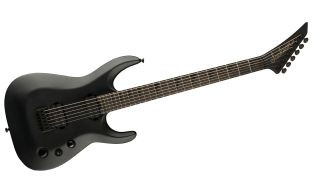 Angled shot of a black Jackson Pro Plus XT Soloist Baritone electric guitar
Angled shot of a black Jackson Pro Plus XT Soloist Baritone electric guitar
(Image credit: Jackson)
6. Jackson Pro Plus XT Soloist SLAT HT6 Baritone
Jackson’s latest baritone empowers you to explore low tunings without the complexities of extra strings.
Our Expert Review:
Specifications
- Body: Nyatoh (wings)
- Neck: 3-piece Maple, Neck-through
- Scale: 27″
- Fingerboard: Ebony
- Frets: 24, Jumbo, Stainless Steel
- Pickups: Seymour Duncan Sentient Humbucker (neck), Seymour Duncan Nazgûl Humbucker (bridge)
- Controls: 1 x volume, kill switch, 3-way pickup selector
- Hardware: Jackson TOM-Style Adjustable with Anchored Tailpiece, Jackson Sealed Die-cast locking tuners
- Left-handed: No
- Finish: Black
Reasons to Buy
- Powerful Seymour Duncan pickups for aggressive tones
- Locking tuners for enhanced tuning stability in lower tunings
- Kill switch for creating stutter effects
- Lightweight construction contributes to nimble playability
Reasons to Avoid
- Stock strings may be too light for extremely low tunings
- Not the most tonally versatile option, focused on metal tones
At a Glance
✅ Buy if you want low tunings with six-string familiarity: This baritone allows you to tune down to drop-F with appropriate strings while retaining familiar six-string scale patterns and chord shapes, making it a fantastic best guitar for metal music in lower registers without additional strings.
❌ Avoid if you have smaller hands: The 27-inch scale length can make reaching from the 1st to the 5th fret feel substantial, requiring an adjustment period.
Offered exclusively in black, the Jackson Pro Plus XT Soloist Baritone is designed for guitarists who crave low tunings but prefer to avoid the added strings of extended-range guitars. Modern baritones are versatile tools for various metal subgenres, allowing you to achieve extremely low tunings while maintaining standard chord and scale shapes.
Equipped with two of Seymour Duncan’s most metal-focused pickups, the Nazgul and the Sentient, this guitar provides an ideal pairing for ultra-low riffing while retaining clarity and definition. While the neck pickup is described as more ‘vintage’ voiced, we found it to be surprisingly high output and well-suited for smooth lead work or clean arpeggios.
Locking tuners ensure excellent tuning stability and facilitate rapid string changes, a practical feature for aggressive playing. The hardtail bridge further enhances stability, even when tuned down to F. The inclusion of an arcade-style kill switch is a welcome touch, perfect for adding stutter effects during breakdowns or injecting rhythmic interest into lead lines.
More Metal Guitar Options…
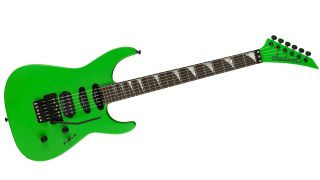 Angled shot of a blue Jackson American Series Soloist SL3 electric guitar
Angled shot of a blue Jackson American Series Soloist SL3 electric guitar
(Image credit: Jackson)
7. Jackson American Series Soloist SL3
A high-performance shred machine that offers surprising versatility.
Our Expert Review:
Specifications
- Body: Alder
- Neck: 3-piece Maple
- Scale: 25.5″
- Fingerboard: Ebony
- Frets: 24
- Pickups: Seymour Duncan JB TB-4 (bridge), Seymour Duncan Flat Strat SSL-6 RWRP Single-Coil (middle), Seymour Duncan Flat Strat SSL-6 Single-Coil (neck)
- Controls: Volume, tone, 5-way selector
- Hardware: Floyd Rose 1500 Series double-locking tremolo
- Left-handed: No
- Finish: Gloss Black, Slime Green, Platinum Pearl, Riviera Blue
Reasons to Buy
- Ultra-fast playability optimized for shredding
- Versatile HSS pickup configuration expands tonal possibilities
- USA-made build quality and craftsmanship
Reasons to Avoid
- Stiff volume pot can feel less responsive
At a Glance
✅ Buy if you demand ultra-fast playability: The Soloist SL3’s rigid neck and flat fingerboard radius make it a premier choice for executing rapid shred licks and technical passages, solidifying its place as a best guitar for metal music shredders.
❌ Avoid if you are on a tight budget: As a USA-made instrument featuring premium Seymour Duncan pickups, the Soloist SL3 carries a significant price tag.
The Jackson American Series Soloist SL3 is a premium metal guitar designed for speed and performance. Featuring high-end components and USA-made craftsmanship, it’s not solely for shredders. Its versatile pickup configuration expands its sonic palette beyond pure high-gain aggression.
Equipped with a Seymour Duncan JB in the bridge position, it’s no surprise that this guitar excels at delivering powerful distorted tones. It offers excellent sustain and a full-bodied sound that inspires shredding. However, the single-coil pickups also provide surprisingly Strat-like tones, offering spanky cleans and bluesy breakup when needed.
The neck is a highlight, boasting exceptional rigidity and a flat radius. Graphite reinforcement rods flanking the truss rod create an incredibly stable playing platform. The Floyd Rose tremolo feels robust and features corrosion-resistant hardware, ensuring years of reliable performance.
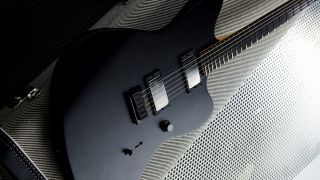 Front view of a white Fender Jim Root Jazzmaster V4 electric guitar on a black guitar case
Front view of a white Fender Jim Root Jazzmaster V4 electric guitar on a black guitar case
(Image credit: Future)
8. Fender Jim Root Jazzmaster V4
An offset mahogany slab + new signature EMGs = pure metal danger.
Our Expert Review:
Specifications
- Body: Mahogany
- Neck: Maple
- Scale: 25.5″
- Fingerboard: Ebony
- Frets: 24
- Pickups: 2x EMG Jim Root Signature Daemonum Open-coil Active Humbuckers (neck and bridge)
- Controls: 1 x master volume, 3-way blade pickup switch
- Hardware: 6-saddle string-through hard-tail
- Left-handed: No
- Finish: Polar White
Reasons to Buy
- Jazzmasters offer a cool and unique aesthetic in metal
- EMG Jim Root Signature Daemonum pickups are incredibly powerful
- Appeals to players beyond just Jim Root fans
Reasons to Avoid
- Jazzmaster body shape can feel unwieldy to some players
At a Glance
✅ Buy if you want a traditional guitar shape geared for metal: Beneath its classic Jazzmaster body, this guitar houses pickups capable of unleashing truly ferocious metal tones, making it a unique best guitar for metal music option.
❌ Avoid if you desire maximum tonal versatility: With a simplified control layout of just a master volume and 3-way pickup selector, it may not suit players who prioritize a wide range of tonal options.
Jim Root has consistently taken classic Fender designs and weaponized them for modern metal. His new Jazzmaster is like fitting a surface-to-air missile launcher onto a vintage station wagon.
This guitar features a non-traditional, heavier mahogany body. The controls are streamlined to essentials: a 3-way blade switch to select between his signature active EMG Daemonum pickups or both, and a master volume. Tone controls are omitted for a direct, unfiltered signal path.
The result is a guitar that retains the Jazzmaster silhouette but delivers a decidedly non-traditional voice. It offers a solid low-end foundation, with bright mids and highs that truly come alive as gain levels increase.
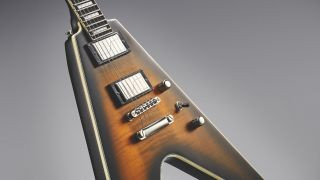 Angled shot of a yellow Epiphone Prophecy Flying V electric guitar
Angled shot of a yellow Epiphone Prophecy Flying V electric guitar
(Image credit: Future)
9. Epiphone Prophecy Flying V
A supercharged take on a classic metal guitar design.
Our Expert Review:
Specifications
- Body: Mahogany with AAA flame maple veneer
- Neck: Mahogany, set
- Scale: 24.72″
- Fingerboard: Ebony
- Frets: 22
- Pickups: 2x Fluence custom voiced humbuckers
- Controls: 1 x volume w/ push-pull, 1 x master tone w/ push-pull, 3-way toggle
- Hardware: LockTone Tune-O-Matic Bridge with LockTone stop bar, Grover Rotomatic locking tuners
- Left-handed: No
- Finish: Yellow Tiger Aged Gloss, Black Aged Gloss
Reasons to Buy
- Stunning finish options
- Versatile Fishman Fluence humbuckers with multiple voicings
- Impressively high build quality for the price
Reasons to Avoid
- Active pickups may not be preferred by all players
At a Glance
✅ Buy if you need a metal guitar for live performances: Flying V guitars are inherently stage-ready instruments, making this Prophecy model an excellent choice for gigging metal guitarists.
❌ Avoid if you primarily play at home sitting down: Despite their striking aesthetics, V-shaped guitars are not ergonomically designed for comfortable seated playing.
Epiphone’s Prophecy range modernizes classic designs for the 21st century – and the Prophecy Flying V is a prime example. It’s a true metal monster, packed with high-end features, from the asymmetrical neck profile to the sophisticated Fishman Fluence custom-voiced humbuckers.
The push-pull volume and tone pots offer unique functionality beyond standard coil-splitting, thanks to the Fluence pickups. They toggle between a high-output modern humbucker voicing and a classic Burstbucker/PAF-style tone, providing exceptional versatility for metal and beyond. In our testing, we discovered it’s even capable of producing beautiful clean tones.
While we might have appreciated a Prophecy model with passive humbuckers, similar to past Epiphone iterations, the Fluence pickups are undeniably impressive. The Prophecy Flying V delivers exceptional value for its price.
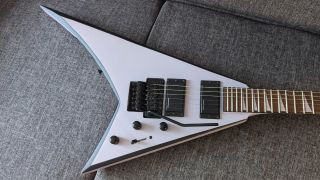 Close-up angled shot of the body of a black Jackson X Series Rhoads RRX24 electric guitar
Close-up angled shot of the body of a black Jackson X Series Rhoads RRX24 electric guitar
(Image credit: Future/Matt McCracken)
10. Jackson X Series Rhoads RRX24
A sharp, modern take on the V shape with active Seymour Duncan humbuckers.
Our Expert Review:
Specifications
- Body: Basswood
- Neck: Maple
- Scale: 25.5″
- Fingerboard: Indian laurel with black shark-fin inlays
- Frets: 24
- Pickups: 2x Seymour Duncan Blackout AHB-1 humbuckers (neck and bridge)
- Controls: 2 x volume, 1 x master tone, 3-way blade pickup switch
- Hardware: Floyd Rose Special Double-locking Tremolo, Jackson die-cast tuners
- Left-handed: No
- Finish: Gloss Black, options include Black with Neon Green or Neon Pink Bevels, Red with Black Bevels (slight price increase for bevel options)
Reasons to Buy
- Specifically designed and equipped for metal
- Searing high-gain tones
- Excellent sustain
Reasons to Avoid
- Limited color options beyond black
At a Glance
✅ Buy if you want a modern ‘V’ guitar: The RRX24 is a quintessential modern metal guitar, featuring an all-black aesthetic, active pickups, and a locking tremolo system, making it a strong contender for the best guitar for metal music with a V-shape.
❌ Avoid if you primarily play sitting down: Like all V-shaped guitars, the RRX24 is best suited for playing while standing.
Countless iterations of Jackson’s iconic Randy Rhoads V have emerged over the years, but this X Series Rhoads RRX24 – introduced in 2020 – stands out for its value and on-point metal style.
It’s blacked-out, featuring a reverse six-in-line headstock for added aggression. Optional neon bevels are available for a slight upcharge if you desire a touch of color. While aggressively styled, the Rhoads V shape is a time-tested classic in the metal world.
Playability is key here. We found it less comfortable when seated but exceptional when standing. It’s built for shredding, equipped with dual active Seymour Duncan Blackout pickups that deliver high-output performance perfect for metal. And it includes a Floyd Rose tremolo for dive bombs and expressive techniques.
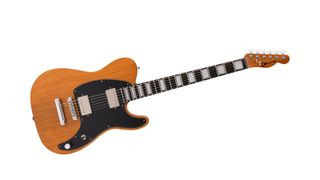 Angled shot of a natural wood Charvel Pro-Mod Joe Duplantier San Dimas Style 2 electric guitar
Angled shot of a natural wood Charvel Pro-Mod Joe Duplantier San Dimas Style 2 electric guitar
(Image credit: Charvel)
11. Charvel Pro-Mod Joe Duplantier San Dimas Style 2
Flatten cities with this tonal powerhouse…
Our Expert Review:
Specifications
- Body: Mahogany
- Neck: Mahogany
- Scale: 25.5″
- Fingerboard: Ebony with pearloid block inlays
- Frets: 22
- Pickups: DiMarzio Joe Duplantier Signature Fortitude humbucker (bridge), DiMarzio PAF 36th Anniversary humbucker (neck)
- Controls: 1 x master volume, 3-way toggle pickup switch
- Hardware: String-through body hardtail bridge
- Left-handed: No
- Finish: Natural Mahogany
Reasons to Buy
- A refined, modern update on the classic T-style electric guitar
- Incredible-sounding DiMarzio pickups
- Exceptional Charvel playability
Reasons to Avoid
- May be too understated for players seeking a more overtly “metal” aesthetic
At a Glance
✅ Buy if you want a metal guitar with a traditional design: On the surface, this signature Charvel resembles a classic Telecaster, but it’s a true metal machine underneath, making it a great best guitar for metal music option for traditionalists.
❌ Avoid if you are drawn to typical metal aesthetics: If you prefer pointy shapes and an all-black, aggressive visual style, this guitar may not align with your preferences.
The evolution of Gojira’s riff master’s signature San Dimas Style 2 continues, and this iteration, unveiled at NAMM 2020, is the most refined yet. The black pickguard adds a touch of modern aggression, particularly appealing if you’re transitioning from a vintage-style Telecaster and want to explore downtuned metal riffing.
The playability is exceptional. Charvel is renowned for hot-rodded guitars, and the 12-16” compound radius fingerboard on recent models is supremely comfortable for both chording and fast arpeggios. The Charvel Speed Shape neck profile is joined to the body with a four-bolt heel for solid resonance and sustain.
However, the pickups are the true highlight. Duplantier’s signature DiMarzio Fortitude bridge pickup is hotter and designed for articulate, downtuned riffs saturated in gain. The DiMarzio PAF 36th Anniversary neck pickup aims for the revered tones of a ’59 Les Paul, offering warmth and clarity.
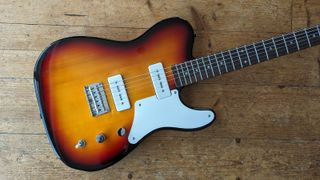 Angled shot of a sunburst Squier Paranormal Baritone Cabronita Telecaster electric guitar lying on a wooden floor
Angled shot of a sunburst Squier Paranormal Baritone Cabronita Telecaster electric guitar lying on a wooden floor
(Image credit: Future/Matt McCracken)
12. Squier Paranormal Baritone Cabronita Telecaster
One of the best alternative metal guitars for players seeking something beyond humbuckers.
Our Expert Review:
Specifications
- Body: Poplar
- Neck: Maple
- Scale: 27”
- Fingerboard: Indian Laurel
- Frets: 22
- Pickups: 2x Fender Designed Alnico Soapbar Single-Coil
- Controls: 1 x volume, 1 x tone, 3-way toggle pickup switch
- Hardware: Chrome, 6-Saddle Strings-Through-Body Hardtail Bridge
- Left-handed: No
- Finish: Sunburst, Surf Green
Reasons to Buy
- Unique, growling soapbar pickups offer a distinctive tone
- A refreshing alternative to humbucker-dominated metal guitars
- Fat low-end response
- Classic Telecaster aesthetic
Reasons to Avoid
- May be too bright and twangy for players seeking traditional high-gain metal tones
At a Glance
✅ Buy if you want a great value baritone with a twist: It may resemble a classic Telecaster, but this Squier baritone can confidently deliver djent tones and stand alongside more overtly “metal” guitars, offering phenomenal value as a best guitar for metal music alternative.
❌ Avoid if you prefer active pickups: This Squier features soapbar pickups, a departure from the active pickups commonly found in modern metal guitars.
A somewhat unexpected entry for the best guitar for metal music, but the Squier Paranormal Baritone Cabronita Telecaster is surprisingly effective. While soapbar pickups don’t offer the same extreme saturation as active humbuckers, they possess a unique growl and mid-range emphasis that allows them to cut through a mix. They distort effectively and offer a range of usable tones. If your metal style incorporates clean passages and intros, this guitar is an excellent choice.
The 27” scale length is well-suited for B to B tuning (standard baritone tuning) and contributes to a powerful low-end response, perfect for delivering massive riffs. Squier’s renowned build quality and affordable price point make this guitar an exceptional value. The Telecaster body shape is also a classic, comfortable, and versatile design for any playing situation.
FAQs
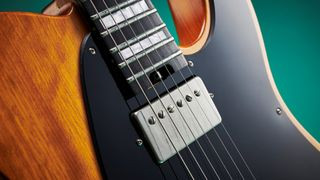 Close-up of the neck humbucker on a Charvel Joe Duplantier signature model electric guitar
Close-up of the neck humbucker on a Charvel Joe Duplantier signature model electric guitar
(Image credit: Future)
Do I need a specific metal guitar to play metal?
Contrary to common assumptions, no – you don’t strictly need a specific “metal guitar” to play metal music. While having a guitar designed for the genre certainly makes achieving high-gain tones easier, it’s not a prerequisite. Sometimes, even single-coil pickups can sound surprisingly powerful and effective in a metal context. Experimenting with different tones is key to finding what suits your style.
However, for achieving those truly crushing, gain-drenched metal tones, the best guitars for metal music are specifically engineered to simplify your pursuit of sonic heaviness. The hardware, electronics, neck profiles, fingerboard radii, and body woods are all carefully selected to extract the best possible metal tones from the instrument. And who wouldn’t want a purpose-built shred machine designed for extreme performance?
What are the best brands for metal guitars?
While most guitar brands offer instruments suitable for metal, certain brands have become particularly associated with the genre and are frequently seen on metal stages. ESP, Schecter, Ibanez, and Jackson are immediately recognizable as leading metal guitar brands. Playing metal demands a lot from your instrument, and these brands consistently produce high-output guitars designed for fast playing and delivering heavy tones.
Why don’t major brands like Fender and Gibson directly market “metal guitars”? It’s likely because they own sub-brands that allow them to more effectively target the metal market. Fender owns Jackson and Charvel, both renowned for producing extreme, aggressively styled guitars. Gibson, similarly, owns Epiphone and Kramer, which manufacture instruments catering to metal players.
Are 7-string or 8-string guitars better for metal music?
The choice between 6, 7, or 8-string guitars depends entirely on the specific style of metal you intend to play. If you’re drawn to more traditional metal subgenres like thrash, heavy metal, power metal, or hair metal, a six-string instrument will likely be sufficient. You can tune down a six-string for heavier sounds, but it’s not always necessary, as these styles often utilize tunings closer to standard E standard.
However, if you’re interested in modern metalcore, djent, or progressive metal, then extended-range instruments like 7-string guitars or 8-string guitars are almost essential. They provide the extended low-end range crucial for these genres. These guitars typically feature longer scale lengths to accommodate lower tunings while maintaining string tension. While they offer a wider sonic palette, they do require an adjustment period due to the extra strings.
If you want to retain the playability of a standard six-string but still achieve lower tunings, consider exploring baritone guitars. These instruments feature a longer scale length than standard guitars but maintain six strings, allowing you to play familiar chords and scales in lower registers.
Which pickups do I need in my metal guitar?
High-output humbucker pickups are generally ideal for metal because they provide the necessary gain and harmonic richness to achieve extreme tones. Pickup manufacturers like EMG specialize in active pickups, which are powered by batteries and deliver exceptionally high output and precise tones, making them highly regarded as some of the best pickups for metal.
Companies such as DiMarzio, Seymour Duncan, and Bare Knuckle specialize in passive pickups. While having slightly lower output than active pickups and not requiring batteries, they often sound more organic and “classic” while still generating sufficient output for aggressive metal tones. Many of the best guitars for metal music come equipped with pickups from these manufacturers.
What is the difference between active and passive pickups?
Many guitars on this list feature active pickups due to the strong association between metal and high-gain tones. Active pickups require an external power source (typically a 9V battery) and tend to compress the signal, which is beneficial for fast, complex riffing. Active pickups are also known for their low noise floor, which is advantageous when playing at high gain levels.
Passive pickups exhibit different characteristics. When you reduce the volume knob on a guitar with passive pickups, you’ll typically notice a decrease in overdrive and a warmer tone as high frequencies are rolled off (unless a treble bleed circuit is installed). Some guitarists find this dynamic response desirable, allowing them to subtly adjust their guitar tone without switching amplifier channels. Active pickups, in contrast, tend to maintain a more consistent frequency response across the volume knob’s range.
While active pickups offer technical advantages, some “tone purists” prefer passive pickups for their perceived organic feel and responsiveness. Ultimately, the best choice depends on personal preference and playing style. It’s worth noting that renowned guitarists like Dave Gilmour and Steve Lukather have utilized guitars with active pickups, demonstrating their versatility and quality.
What is the best tuning for metal?
Downtuning is a common practice in metal music. Standard E standard tuning is suitable for some metal styles, but many metal guitarists prefer to tune one or more strings lower to achieve heavier, darker sounds. Longer scale lengths can improve tuning stability when tuning down significantly to C or B. Baritone guitars, with their longer scale lengths (typically around 27″) and standard B to B tuning, are specifically designed for lower tunings.
7 and 8-string guitars further expand the low-end range available to metal guitarists. They retain the high-frequency range of standard guitars while adding extra low strings for earth-shattering low-end power.
Does guitar body shape matter for metal?
Despite the prevalence of pointy and aggressively shaped guitars in metal, body shape is not a defining factor in whether a guitar is suitable for the genre. While visually striking “weapon-like” guitars contribute to the metal aesthetic, they are not always the most comfortable instruments for seated playing. If you do a significant amount of songwriting or practice while seated, you might prefer a body shape that is more ergonomic in that position.
Ultimately, a simple black guitar with a classic body shape can be just as “metal” as a more extreme design. It’s the player and their musical approach that truly define the “metal-ness” of a guitar.
Should I choose a hardtail or locking tremolo for metal?
The choice between a hardtail bridge and a locking tremolo (like a Floyd Rose) depends on your playing style and the specific metal subgenres you play.
If you are primarily a rhythm guitarist who needs maximum stability and reliability, a hardtail bridge is likely the better option. Hardtail bridges are less prone to tuning instability compared to tremolo systems. String-through-body or Tune-o-matic style bridges are both excellent choices for rhythm-focused metal players.
If you are a lead guitarist who incorporates dive bombs, vibrato, and other tremolo-based effects into your playing, a locking tremolo system is essential. Locking tremolos prevent strings from slipping out of tune by clamping them at the nut and bridge, allowing for extreme tremolo use without sacrificing tuning stability.
Read more about our rating system, how we choose the gear we feature, and exactly how we test each product.
How We Choose the Best Metal Guitars
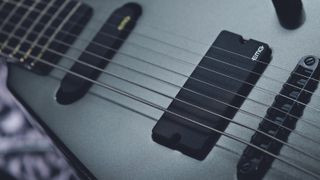 Close-up of an EMG active humbucker pickup on a Peavey electric guitar
Close-up of an EMG active humbucker pickup on a Peavey electric guitar
(Image credit: Future)
At Guitar World, we are not just writers; we are dedicated metalheads with extensive experience playing live and recording in the studio. Our process for selecting the best guitars for metal music involves a meticulous evaluation of tonal aggression, playability, build quality, and overall value. We rigorously test guitars across various metal subgenres to ensure our recommendations meet the demanding standards of metal guitarists.
Precision and power are the hallmarks of metal, and our selection process reflects this ethos. We would never recommend a guitar that we wouldn’t personally use. Having played in numerous metal bands over the years, we understand the performance expectations of a truly great metal guitar.
Whether you are a beginner just starting your metal journey or a seasoned shredder, the guitars in this guide represent a diverse spectrum of options, from affordable instruments to professional-grade extended-range models. Each recommendation has earned its place through rigorous testing, guaranteeing it aligns with the uncompromising demands of the metal genre.
